Projects
The UNESCO Chair on Urban Resilience (SDU.Resilience) is leading and partner of several national and international projects.
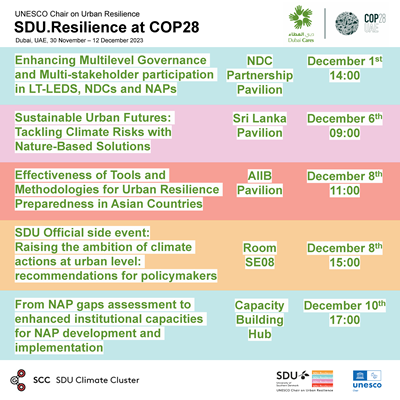
30 November 2023 – 12 December 2023
CLUSTERS:
Climate governance
Climate finance
The UNESCO Chair on Urban Resilience participates in several events at COP28 to present the following projects:
Urban Climate Action. Urban content of NDCs, Country Briefs, and Country Profiles
Partner: UN-Habitat
Read more: Urban Climate Action. Urban content of NDCs
Preliminary analysis of the urban water content of the NDCSs
Partner: UNESCO Intergovernmental Hydrological Programme
Read more: Urban water content of the NDCs
Empowering Local Climate Action: Preliminary Analysis of Municipal Climate Plans in Denmark
Partners: Region of Southern Denmark, Aalborg University
Read more: Empowering Local Climate Action
Exploring urban climate finance in the NDCs
Partner: Global Covenant of Mayors
Read more: Exploring urban climate finance in the NDCs
Urban climate action: Policy Brief Series
Editors: Nicola Tollin, Patrizia Gragnani, Stelios Grafakos
Read more: Urban Climate Action. Policy brief series
Funded by SDU Climate Cluster
Duration 2023-ongoing
CLUSTER
Climate Nature-based Solution,
Resilient coastal and maritime planning,
The Elite Centre of Aquatic Nature-based Solutions for climate change adaptation and mitigation (Aqua-NbS) aims to scale up and integrate approaches of Aquatic Nature-based Solutions to expand the provision of multiple ecosystem services.
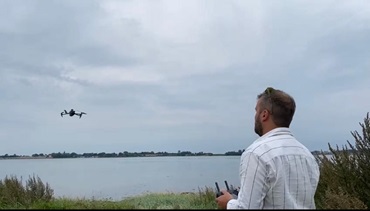
Funded by SDU Climate Cluster
Duration: June 2023-ongoing
CLUSTER
Resilient Coastal and Maritime Planning
Coastal areas are the world’s most populated zones and are changing and growing fast. Anthropic activities and extreme climate events threaten natural areas, communities and settlements. Understanding the environmental status of our coastal and marine environments will support the ide
ntification of priority areas in which restoration of natural elements (e.g., algae, wetlands) will further enhance the capacity to counteract both short and long-term climate impacts and carbon sequestration.
The project will elaborate a “high-definition” analysis of the coastal continuum through the employment of UAV technology (drones) to detect environmental issues and map them to enable administration and policymakers to defend our coastal and marine environment.
https://www.sdu.dk/en/forskning/sdu-climate-cluster/research-projects/fast-track/learning
Funded by SDU Climate Cluster
Duration: January 2023-ongoing
PARTNERS
University of Bristol
Sant’Anna School of Advanced Studies
CLUSTER
Climate finance
The project, financed by a grant from the SDU Climate Cluster, cooperates with researchers from SDU, the University of Bristol and the Sant’Anna School of Advanced Studies. To ensure a just and fair transition to net zero, both national and subnational entities need to abide by common but differentiated responsibilities and respective capabilities. The Article 6 (Ar6) of the Paris Agreement (PA), which aims at promoting higher ambition in mitigation, adaptation and sustainable development through international cooperation, provides mechanisms to achieve such a transition. This research project investigates how the Ar6 can be applied to cities and subnational entities to promote mitigation while financing adaptation.
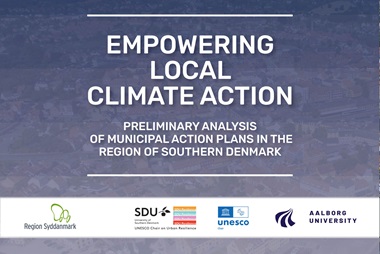
Funded by Region of Southern Denmark
April 2023 - August 2024
PARTNERS
Region of Southern Denmark
Aalborg University
CLUSTER
Climate Governance
The purpose of the work is to generate recommendations for the Region of Southern Denmark related to its role in cooperation and support of the climate plans' preparation and implementation in its 22 municipalities. The research focuses on providing an evaluation of the climate action plans development by taking a multi-stakeholder perspective, understanding the relevance and contribution of municipalities, regions and other stakeholders. The evaluation covers both climate adaptation and mitigation with a mixed-method (qualitative and quantitative) analysis.
The preliminary analysis and recommendations are available at the following link:
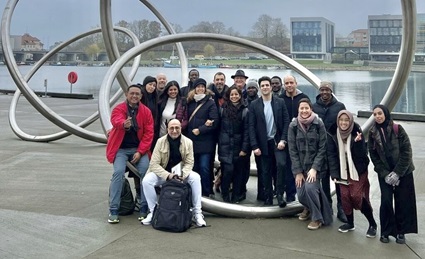
Multidisciplinary approaches to multi-layered urban challenges.
Funded by DANIDA-DFC
November 2022 – December 2022 (3 weeks of training)
PARTNERS
Roskilde University
CLUSTER
Capacity Building for Resilience
Climate Governance
Climate Nature-based Solution,
Resilient coastal and maritime planning
This learning programme is targeted at Urban planning professionals, both public and private, in global south countries, focusing broadly on urban sustainability and inclusiveness to accommodate for greener, more resilient, and more livable cities. The learning programme introduces a combined urban system thinking and wicked problems approach, coupled with process design, strategy and action.
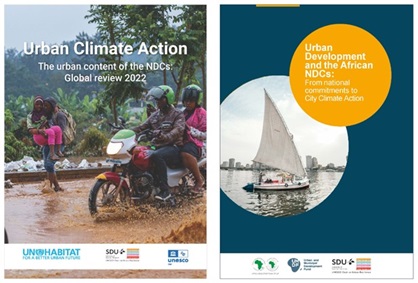
Funded by UN-Habitat and AfDB
January 2022 – December 2022
PARTNERS
UN-Habitat
African Development Bank Group (AfDB)
CLUSTER
Climate governance,
The project aimed to analyse the urban content in the Nationally Determined Contributions (NDCs) using more than 200 indicators, including climate mitigation and adaptationchallenges and responses, considering sectors and subsectors. The work was developed together with the United Nations Human Settlements Programme (UN-Habitat) and the African Development Bank Group (AfDB) and supported by experts from bilateral and multilateral organisations and academia.
Two reports presented at the 2022 United Nations Climate Change Conference or Conference of the Parties of the UNFCCC (COP27) were the main outputs:
(1) Urban Climate Action. The urban content of the NDCs: Global review 2022
https://unhabitat.org/urban-climate-action-the-urban-content-of-the-ndcs-global-review-2022
(2) The report Urban Development and the African NDCs: From national commitments to City Climate Action
https://unhabitat.org/urban-climate-action-the-urban-content-of-the-ndcs-global-review-2022